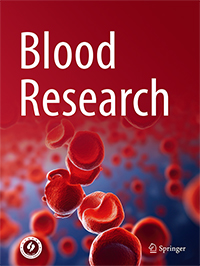Review Article
Korean J Hematol 2007; 42(2):
Published online June 30, 2007
https://doi.org/10.5045/kjh.2007.42.2.71
© The Korean Society of Hematology
골수형성이상증후군에서의 임상진료지침
정준원, 국 훈, 방수미, 이제환, 주영돈, 김인호, 김형준, 박찬정, 박현진, 안진석, 윤성수, 원종호, 이홍기, 정철원, 조덕연, 조 빈, 한경자, 민유홍, 김선희
연세대학교 의과대학 세브란스병원 내과, 전남대학교 의과대학 화순전남대학교병원 소아과, 서울대학교 의과대학 분당서울대학교병원 내과, 울산대학교 의과대학 서울아산병원 내과, 인제대학교 의과대학 부산백병원 내과, 서울대학교 의과대학 서울대학교병원 내과, 전남대학교 의과대학 화순전남대학교병원 내과, 울산대학교 의과대학 서울아산병원 진단검사의학과, 국립암센터 특수암센터 소아종양클리닉, 성균관대학교 의과대학 삼성서울병원 내과, 순천향대학교 의과대학 순천향대학교병원 내과, 건국대학교 의과대학 내과학교실, 충남대학교 의과대학 내과학교실, 가톨릭대학교 의과대학 성모병원 소아과, 가톨릭대학교 의과대학 성모병원 진단검사의학과, 성균관대학교 의과대학 삼성서울병원 진단검사의학과
The Clinical Guidelines for Myelodysplastic Syndrome
The myelodysplastic syndromes (MDS) are characterized by ineffective hematopoiesis associated with multilineage cytopenias leading to serious morbidity or mortality, and the additional risk of leukemic transformation. The management of patients with MDS can be very complex and varies according to both the clinical manifestations in individual patients as well as the presence of complicating medical conditions. However, therapeutic dilemmas still exist for MDS due to the multifactorial pathogenetic features of the disease, its heterogeneous stages, and the elderly patient population. For these reasons, proper guidelines for management are necessary. This review describes the proper diagnosis for MDS, decision-making approaches for optimal therapeutic options that are based on a consideration of patient clinical factors and risk-based prognostic categories, and the use of recently available biospecific drugs such as hypomethylating agents that are potentially capable of abrogating the abnormalities associated with MDS. Proper indications and methods for transplantation, response criteria, management for iron overload for highly transfused patients and specific considerations for MDS in childhood are also described. All of these topics were discussed at the third symposium of AML/MDS working party on 3 March, 2007.
Keywords Myelodysplastic syndrome, Guideline, Diagnosis, Hypomethylating agents, Transplantation, Response criteria, Iron chelating treatment, MDS in childhood
Article
Review Article
Korean J Hematol 2007; 42(2): 71-90
Published online June 30, 2007 https://doi.org/10.5045/kjh.2007.42.2.71
Copyright © The Korean Society of Hematology.
골수형성이상증후군에서의 임상진료지침
정준원, 국 훈, 방수미, 이제환, 주영돈, 김인호, 김형준, 박찬정, 박현진, 안진석, 윤성수, 원종호, 이홍기, 정철원, 조덕연, 조 빈, 한경자, 민유홍, 김선희
연세대학교 의과대학 세브란스병원 내과, 전남대학교 의과대학 화순전남대학교병원 소아과, 서울대학교 의과대학 분당서울대학교병원 내과, 울산대학교 의과대학 서울아산병원 내과, 인제대학교 의과대학 부산백병원 내과, 서울대학교 의과대학 서울대학교병원 내과, 전남대학교 의과대학 화순전남대학교병원 내과, 울산대학교 의과대학 서울아산병원 진단검사의학과, 국립암센터 특수암센터 소아종양클리닉, 성균관대학교 의과대학 삼성서울병원 내과, 순천향대학교 의과대학 순천향대학교병원 내과, 건국대학교 의과대학 내과학교실, 충남대학교 의과대학 내과학교실, 가톨릭대학교 의과대학 성모병원 소아과, 가톨릭대학교 의과대학 성모병원 진단검사의학과, 성균관대학교 의과대학 삼성서울병원 진단검사의학과
The Clinical Guidelines for Myelodysplastic Syndrome
June Won Cheong, Hoon Kook, Soo Mee Bang, Je Hwan Lee, Yong Don Joo, In ho Kim, Hyeoung Joon Kim, Chan Jeoung Park, Hyeon Jin Park, Jin Seok Ahn, Sung Soo Yoon, Jong Ho Won, Mark Hong Lee, Chul Won Jung, Deog Yeon Jo, Bin Cho, Kyoung Ja Han, Yoo Hong Min, Sun Hee Kim
Department of Internal Meidicine, Yonsei University College of Medicine
Department of Pediatrics, Hwasun Hospital, Chonnam National University Medical School
Department of Internal Medicine, Bundang Hospital, Seoul National University College of Medicine
Asan Medical Center, University of Ulsan College of Medicine, Busan Paik Hospital, College of Medicine, Inje University
Department of Hematology, Oncology
Department of Laboratory Medicine, Pediatric Oncology Branch, Specific Organs Cancer Center, National Cancer Center, Sungkyunkwan University School of Medicine, Soonchunhyang University College of Medicine
Konkuk University College of Medicine
Chungnam National University College of Medicine, St. Mary's Hospital
The Catholic University of Korea College of Medicine
Abstract
The myelodysplastic syndromes (MDS) are characterized by ineffective hematopoiesis associated with multilineage cytopenias leading to serious morbidity or mortality, and the additional risk of leukemic transformation. The management of patients with MDS can be very complex and varies according to both the clinical manifestations in individual patients as well as the presence of complicating medical conditions. However, therapeutic dilemmas still exist for MDS due to the multifactorial pathogenetic features of the disease, its heterogeneous stages, and the elderly patient population. For these reasons, proper guidelines for management are necessary. This review describes the proper diagnosis for MDS, decision-making approaches for optimal therapeutic options that are based on a consideration of patient clinical factors and risk-based prognostic categories, and the use of recently available biospecific drugs such as hypomethylating agents that are potentially capable of abrogating the abnormalities associated with MDS. Proper indications and methods for transplantation, response criteria, management for iron overload for highly transfused patients and specific considerations for MDS in childhood are also described. All of these topics were discussed at the third symposium of AML/MDS working party on 3 March, 2007.
Keywords: Myelodysplastic syndrome, Guideline, Diagnosis, Hypomethylating agents, Transplantation, Response criteria, Iron chelating treatment, MDS in childhood

Article Tools
Stats or Metrics
Related articles in BR
-
The role of next-generation sequencing in hematologic malignancies
Young‑Uk Cho
Blood Res 2024; 59(): -
Recent advances in diagnosis and therapy in systemic mastocytosis
Hyun Jung Lee
Blood Res 2023; 58(S1): S96-S108 -
Mycosis fungoides and Sézary syndrome
Hyewon Lee
Blood Res 2023; 58(S1): S66-S82




 PDF
PDF Standard view
Standard view Export citation
Export citation Share
Share  Previous Article
Previous Article



